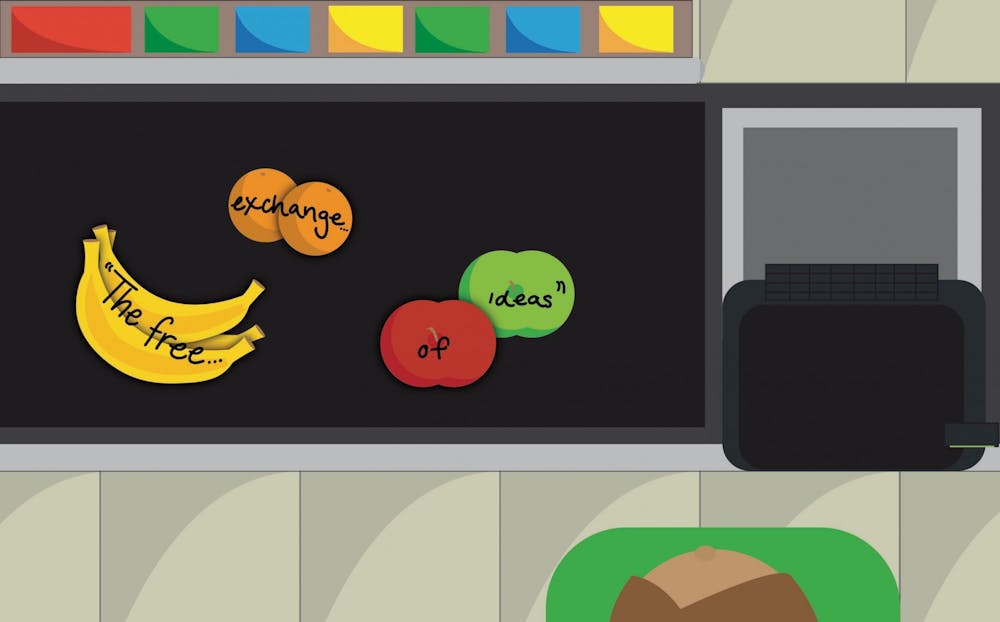Since its founding, the University’s relationship with free speech has been unstable. Thomas Jefferson established the University on “the illimitable freedom of the human mind,” encouraging students to explore thought without constraint. Notwithstanding, the University administration has found ways to undermine students’ speech it deemed unacceptable. In the 1960s, for instance, Dean B.F.D. Runk heavily censored progressive views supporting “racial equality, University reform and an end to the war in Vietnam” by barring the publication of articles expressing such sentiment in The Cavalier Daily. In the 2000s, former University President John Casteen’s administration implemented speech codes designed to punish people for expressing “inappropriate” thoughts. With the abandonment of such practices and the institutionalization of free speech advocates such as University President Jim Ryan, the University today remains true to its intent — upholding traditional devotion to free thought. However, dissenting voices threaten to sever this tie.
College campuses across America are eagerly engaging in “cancel culture” — the phenomenon that calls on society members to ostracize the individual in order to ostracize their ideas. Despite the fact that the University is currently one of the most celebrated advocates for free speech, I would argue that the student body is starting to accept “canceling” people as a means of reducing uncomfortable and offensive speech. The 2021 FIRE report on Political Campus Climate showed that 68 percent of University students said it is permissible to cancel someone from speaking on Grounds for their beliefs. Apprehension arising from cancel culture can also be seen in this report where hundreds of University students detail their fear to voice countercultural perspectives. This growing cancel culture is disastrous because it disrupts the natural flow of the marketplace of ideas.
Free exchange of thought is crucial to the University because, as Jefferson stated, such is the University’s purpose — “to follow truth wherever it may lead, nor to tolerate any error so long as reason is left free to combat it.” Evidently, the University was designed to allow people to discover, by means of critical thinking, which ideas are good or bad and, thereby, which to follow or reject. However, students at the University cannot realize this if they cannot lay siege to all ideas without fear of ostracization. In essence, dialogues allow people to test the validity of ideas. Through building up claims with reason and evidence and posing counterarguments and examples in a meaningful and respectful manner, people can destroy bad ideas and realize good ones. Without the freedom to express dissent, the search for virtue falls through.
Of course, freedom of speech is not without flaws. Most notably, it permits hate speech. Though hate speech is detestable, it is my belief that ostracizing those who express it can incite more hate speech.
The real problem with cancel culture lies in its unintended consequences — specifically, it unintentionally normalizes cancelable thought like hate speech. In my view, this occurs in the following ways. First, cancel culture cultivates stubbornness within canceled individuals’ hearts. Few who get canceled reflect on the merit of their ideas — most just presume their thoughts are good solely because they are unjustly silenced. People who think they have been wronged rarely think they are incorrect. The frequent absence of cordiality while arguing further contributes to this feeling of having been slandered. Second, it opens sympathetic bystanders to fringe ideas. When people think others are unjustly attacked, they naturally side with the victims. Considering that cancel culture ties the individual to the idea, many well-intentioned but uninformed people may fall victim to fringe ideas while defending the canceled individual, especially if such ideas embody general beliefs these bystanders want to believe.
Despite cancel culture’s failures, other forms of cultural intervention can still be beneficial. By condemning bad ideologies with reason, humility and cordiality, the University community can authoritatively promote better ideas. This is, in part, due to societal pressures that urge conformity. Among the student body, pressures against hate speech, for example, are potent and, thus, compel most prejudiced students to believe in its abhorrence. However, as revealed by cancel culture, social sanctions alone cannot change others’ minds. People understand which ideas to uproot through productive dialogues. These occur when participants are reasonable enough to logically explain their beliefs, humble enough to recognize valid criticism of their argument and cordial enough to alleviate animosity when ideological conflicts arise. Reason, humility and cordiality — the pillars of dialogue — must supplement community-wide condemnations.
To establish this harmony and maintain the natural progression of the marketplace towards discovering good and bad ideas, the University’s culture must change. Students should try to understand each other’s beliefs, remain open to criticism and, most importantly, genuinely struggle towards absolute truth while carrying an open mind and a compassionate heart. Acknowledging the need for reason, humility and cordiality in dialogues is essential for this University to prosper.
Rob Clawes is a Viewpoint Writer for The Cavalier Daily. He can be reached at opinion@cavalierdaily.com.
The opinions expressed in this column are not necessarily those of The Cavalier Daily. Columns represent the views of the authors alone.







